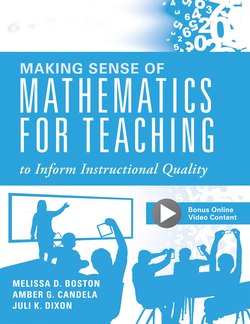Читать книгу Making Sense of Mathematics for Teaching to Inform Instructional Quality - Juli K. Dixon - Страница 8
На сайте Литреса книга снята с продажи.
ОглавлениеPART 1
Connecting to the T in TQE: Tasks and Task Implementation
In this book, you will analyze and reflect on teaching mathematics at each stage of the TQE process using the Instructional Quality Assessment in Mathematics Toolkit rubrics. Part 1 connects to the T in the TQE process: “Tasks: Select tasks that support identified learning goals” (Dixon, Nolan, & Adams, 2016, p. 4). Implementing tasks that elicit thinking and reasoning can increase all students’ access to high-quality mathematics. Throughout chapters 1 and 2, we highlight features of tasks and instruction in mathematics classrooms that promote access for all learners.
As you explore chapter 1, you will consider the impact of different types of tasks on students’ learning of mathematics. In your work as a mathematics teacher (or with mathematics teachers), you have encountered many mathematical tasks—problems, exercises, homework sets, examples, activities, and so on—some of which have been interesting and challenging, and some of which have been routine and procedural. In this book, we use the term mathematical task to describe a problem or a set of problems that address a similar mathematical idea (Stein et al., 2009). A task can consist of a simple one-step problem, a complex multipart problem, or a series of related problems. Different types of tasks have different potential for engaging students in rigorous mathematics. We introduce the IQA Potential of the Task rubric in chapter 1 to provide a structure for analyzing the level and type of thinking a mathematical task might elicit from students.
Have you ever experienced a mathematics lesson in which you thought the task seemed simple, but surprisingly elicited much greater interest, thinking, and engagement than you anticipated? Conversely, have you experienced a mathematics lesson in which you anticipated the task to be interesting and engaging, but it some-how fell short of eliciting students’ mathematical thinking and reasoning? The IQA Implementation of the Task rubric, introduced in chapter 2, will provide a structure for analyzing how instructional tasks play out during mathematics lessons.
